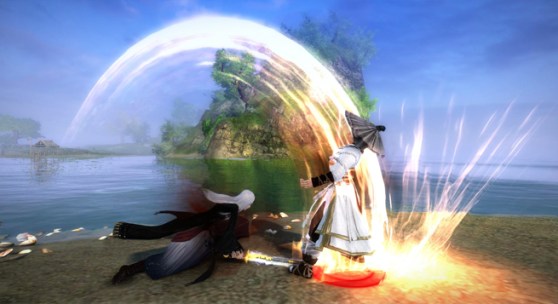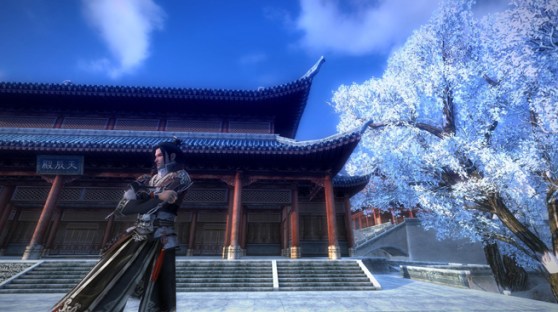Lynch demonstrates those risks by kidnapping another character and selling them into slavery. It takes him a lot of tries. First, he has to mentally dominate his victim. A strong will from a higher-level character not only shrugs off the attempt, but it temporarily paralyzes the would-be kidnapper, leaving you vulnerable should any nearby do-gooders take offense and decide to pummel you for your misdeeds. Indeed, Lynch soon ends up in jail, where he either has to do his time, wait for friends to extricate him, or bribe or beat the guard in a game of dice.
Prison stays increase according to your record of villainy. Truly heinous evil-doers with high infamy are attacked on sight by guards, thrown in maximum-security jails, and publicly executed. That locks the character out for a few days.
Color-coded icons instantly clued me in to every player’s alignment. A red skull told me a man on horseback was a murdering, thieving low-life … and fair game for a heroic takedown. Possibly another player had already put a bounty on his head. “We have a policing feature,” says Rawlins. “Players can join a police force, find warrants, hunt those players down, and kill them.” Reporting it back to the local constabulary earns the reward.
It doesn’t even have to go that far. I encouraged Lynch to just go beat someone up so I could have a good look at the combat. He did, and five passers-by immediately jumped in. Lynch got trashed, while his opponents crowed about sending a GM back to jail. Consider Wushu’s self-regulation between good and evil playstyles already in place.
“We’d see five people walk into a city and start a brawl,” adds Lynch. “All of a sudden, people are jumping over the roofs, coming into it. We saw 35 people just brawling in the street.” And that’s nothing compared to when guilds start fighting over properly.
The combat plays out in real time, and while the expanse of optional quests and tasks is enough to make any MMO player salivate, I found all the attention paid to the combat system far more intriguing. It approaches the depth and complexity of a typical fighting game while still looking fairly approachable. “This isn’t your typical MMO where you press your 1-2-3, 1-2-3 button rotation,” says Lynch. “It’s about what’s going on in that situation, based on your combat style. You have to watch the other player.” That’s crucial to counter their attacks, feint to get in under defenses, and hit hard with the most effective weapons and moves.
“It’s how skillful are you,” says Lynch. “How well do you know your class? How well do you know their skills? How well can you adapt to whatever you’re fighting?”
Of course, it’s not all combat. I watched Lynch challenge a fellow chef in a cook-off — a Bejeweled-style puzzle game — to get materials and experience he needed. It’s also one way to become the master of your chosen profession. But part of the game’s economy revolves around bartering with those different professions to get what you want. “I have to communicate with other characters to make the best sword,” says Rawlins. That could mean bartering with a chef to sharpen the blade to perfection, a craftsman to make the best grip, even an apothecary to lace the edge with poison.
And that’s the outer edge of what Age of Wushu does. I only saw a fraction of professions, a sliver of what guilds do, and a bare minimum of the economy in action. Mainly Lynch fencing his kidnapee. I only saw one city. I don’t see the campaign or any raids at all, but they’re definitely there.
Compared to just what content I do see, the actual free-to-play component feels minor at best. You might get a cart to sell wares while offline, and maybe a few new (but not more powerful) moves. Otherwise, all the microtransactions are strictly cosmetic, like clothes. Even the playtime limitations enforced during the beta go away when Snail USA flips the switch on April 10 and Age of Wushu goes live in the States. Better still, characters created in the beta will simply roll over, with all stats and loot intact.
Rawlins hopes those player become guides for everyone who joins the live game. After all, every kung-fu master needs students. That’s a classic wuxia scenario if ever there were.
VentureBeat's mission is to be a digital town square for technical decision-makers to gain knowledge about transformative enterprise technology and transact. Learn More



